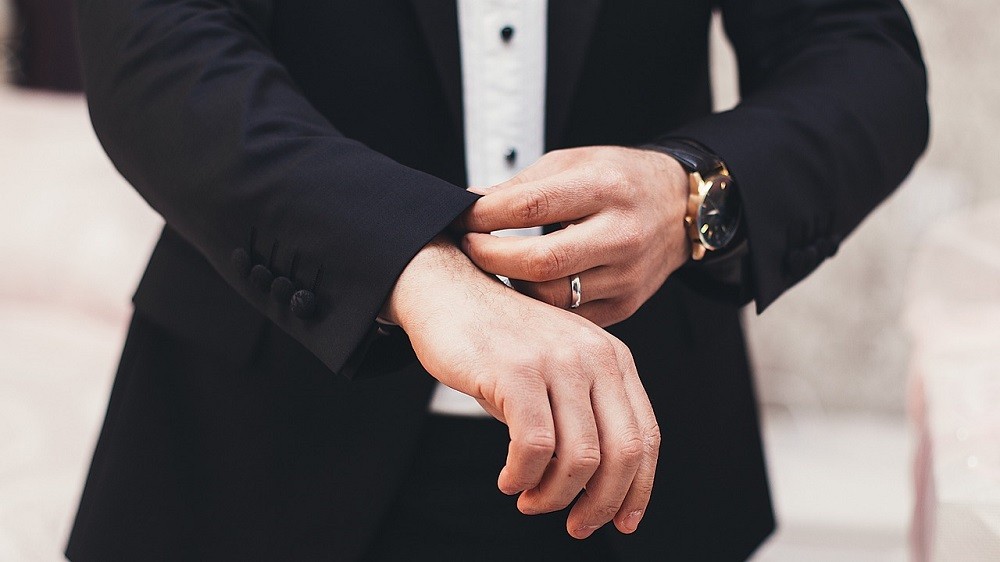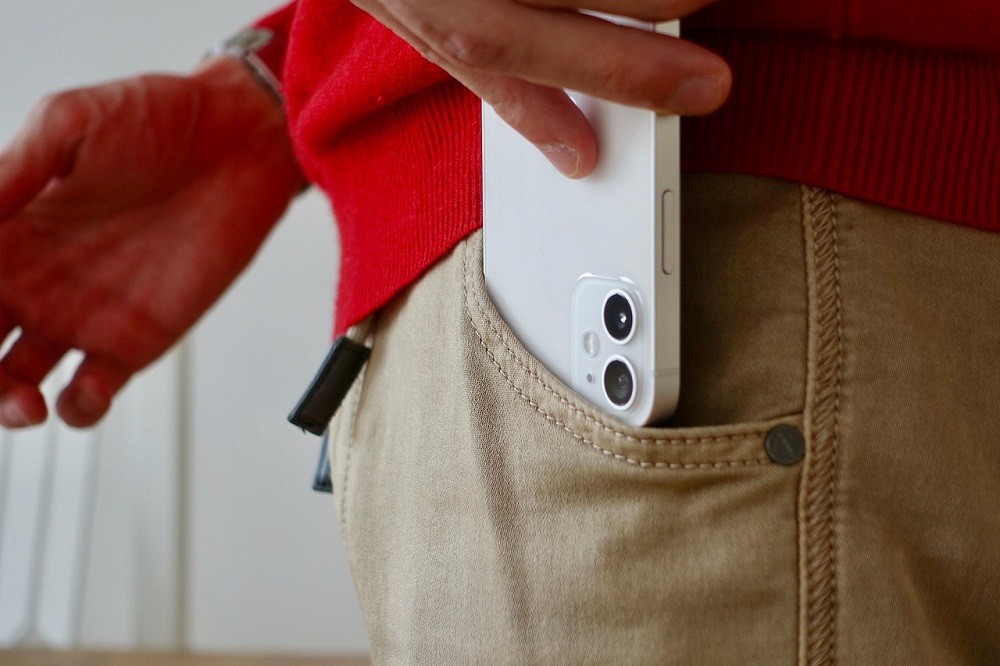The Esteemed Gentleman Articles
10 Commandments of Modern Etiquette You Need To Know
Etiquette, along with manners, are valuable, practical skills everyone should practice daily. It doesn't cost anything to be kind and the satisfaction of doing a good deed or making someone's day is a huge mood boost for both you and the person you helped. In this article we will look at 10 modern etiquette skills you need to know:
Know How To Shake Hands Properly
A firm handshake can reveal a lot about your character. When shaking hands with someone, you are establishing trust, respect, and courtesy. This non-verbal action is practiced all over the world, so knowing how to shake hands properly is a valuable skill to learn.
Your handshake should fall in the sweet spot between not limp-fish loose and not bone-crushingly strong. When someone offers you their hand, aim for the webbing between their thumb and index finger. The webbing of your hand should meet with theirs. Then close your hand and shake at least 2 to 3 times.
If you want to learn the correct technique on shaking hands, read our article How To Shake Hands In A Post-Pandemic World.
While shaking hands, you should make eye contact with the person you are engaging with. Looking around, looking down, or closing your eyes could be seen as distrust. Offering a smile along with eye contact shows the other person that you can be trusted, which is very valuable in business settings.
Say "Please" And "Thank You" Often
Being able to effectively use the words "please" and "thank you" can help you navigate through almost any social interaction. These two simple gestures display respect, appreciation, and can help strengthen relationships. Some argue that using these words are vital to daily interactions.
The cost of saying these simple words is nothing, yet the impact is very powerful. Adding "please" (in a calm, respectful tone of voice) to a sentence can turn any demand into a simple request. This can be very beneficial in business settings and when interacting with people in the service industry like cashiers and restaurant waitstaff.
A genuine "thank you" to the barista that made you your morning coffee or to the person who held the door open for you when your hands were full can go a long way. This simple acknowledgement and recognition of their kind actions is a reminder that there are still good people in this world.
Sincerity is very important when saying "thank you". If you want to make the other person feel really good about themselves, tell them what you are thankful for. Even a simple "thank you for staying late yesterday. It really helped the team out" or "thank you for the coffee this morning. I really needed it" expresses specific gratitude towards their good deed.
Practice Good Table Manners
Practicing good table manners shows respect and consideration for everyone seated at the table. Simple actions like keeping your elbows off the table, not talking with your mouth full (or chewing with your mouth open), and not making impolite noises are all basic manners that everyone should follow.
When seated at a table, keep your conversations at a respectable volume and avoid discussing sensitive topics like finances, politics, religion, or sex. Avoid being disruptive, especially if there are other people seated nearby. It is okay to laugh at jokes, but avoid laughing so loud it interrupts other people's conversations.
One often overlooked form of good table manners is placing your napkin on your lap before your meal arrives. Doing so protects your lap from any crumbs or spills you may encounter while eating. It also signals your server that you are ready for your meal.
Unless you are the host, you should never be the first one to start eating. Wait until everyone has their food or until the host, or most important person at the table, says otherwise. Digging in right away shows a lack of both self-control and awareness.
If you are unsure of what utensil to use or how to hold them, observe others at your table. Do not be afraid to ask someone who looks like they know what they are doing. The two most popular styles of holding cutlery are American and Continental (sometimes referred to as European). For more information, check out this helpful guide.
Take Pride In Your Appearance. Learn The Art Of Style
Taking pride in your appearance is a sign of self-respect. Wearing clothes that make you feel good will boost your confidence, increase your self-esteem and it shows others that you can be trusted. Dressing well isn't a science but it does require some effort.
If you aren't sure how to upgrade your style, start with wearing a patterned button-up shirt with dark-wash jeans. This is a versatile outfit that can easily be dressed up with the addition of a sport jacket, perfect for date nights and semi-formal events.
Incorporate accessories like pocket squares or a piece of neckwear to give your outfit a more personal touch. Don't be afraid to experiment with a bold colour or two to stand out, but always refer to the colour wheel so your outfit looks harmonious.
Many first impressions will be based off of your outfit so take extra time to ensure that everything looks good before you head out the door. Double check your buttons are done up properly, your zipper is up, and everything is where it should be.
Practice, And Maintain, Good Personal Hygiene
A very important part of being well dressed includes maintaining good personal hygiene. The basics of personal hygiene include brushing and flossing daily, wearing an antiperspirant or deodorant, trimming your nails and showering regularly. (For a more in-depth list, consult our Ultimate Mens Grooming Checklist).
Not cleaning your body can result in a build-up of oils, dirt, and dead skin cells which can cause bad odours, acne, dry skin, and irritation. To avoid this, shower with warm water (not hot) and use a loofah or sponge with a gentle soap. Don't scrub too hard or you may irritate or break your skin.
Avoid using 2in1 shampoo and conditioners as they do more harm than good. Instead, purchase a separate shampoo and conditioner. Shampoo your hair every second day but condition every time you shower. This will keep the natural oils in your hair, encouraging growth and resulting in a fuller head of hair. You could also use a hair mask for extra protection and nourishment.
Once you are finished your shower, apply an unscented moisturizer to protect your skin and to give it vitamins and nutrients to help maintain a healthy appearance. We recommend applying a moisturizer with an SPF rating of at least 30 to your face. This will keep it protected from the suns UV rays.
If you have any facial hair, be sure to maintain it at least once a week (or more if it grows fast). Trim any wild hairs and use products like beard oils if required. Just like the hair on your head, your facial hair needs to be well taken care of if you want it to look healthy.
Some people like to wear a fragrance. If you do, be sure to read our article A Simple Guide On How To Make Your Fragrances Last Longer to keep it radiating all day long. If you are someone who does not wear a fragrance, our article 9 Fantastic Reasons to Wear A Fragrance may make you change your mind.
Put Your Phone Away When You Are In The Company Of Others
The average person spends over 4.5 hours on their phone every day. Granted, some of that screen time may be spent doing work-related tasks, but some of it may be spent while in the presence of others. Sometimes we need to remind ourselves to put our phones away when we are with other people.
The time we spend interacting with other people face to face builds relationships much faster and stronger than just texting. During face-to-face interactions we can pick up on social cues like body language, tone of voice and facial expressions which can deepen our relationships.
Although it would be nearly impossible to ditch our phones completely, we can make a conscious effort to resist the urge to check it when we are with company. Simple actions like turning the phone off, turning off notifications, and putting your phone in your pocket or bag can help reduce the urge to reach for it when there's a lull in conversation or the person you are speaking to goes to the washroom.
Phone snubbing, also known as 'phubbing', is becoming more common especially with younger generations who are growing up in an increasingly digital world. (Our article What Is Phubbing? Goes into more detail about what it is, how it affects relationships, and how to stop doing it). It is up to the adults and mentors to set good examples and either limiting screen time or having a screen-free day every month.
Be Punctual. Respect Other Peoples Time
Punctuality is the practice of being on time. It is considered by many as a form of respect and a sign of good etiquette. Practicing punctuality includes being aware of your appointments and deadlines, not overloading your schedule and respecting other people's time as well.
Arriving on time, preferably ahead of time, shows others that you are organized, reliable and considerate. If, for any reason, you are going to be late, be sure to notify whoever you are meeting and let them know as soon as possible. For a step-by-step guide on what to do if you are running late, read our guide Stress Free Solutions: How To Handle Running Late.
Punctuality goes beyond appointments and scheduling; it also includes preparedness. Being organized and both mentally and physically ready to tackle whatever task you need to get done will greatly reduce the time and energy spent frantically searching for something you desperately need. Checklists, priority matrixes, and utilizing the Pomodoro Technique are all techniques you can use to be prepared.
Other people have their own deadlines and schedules. It is good etiquette to be mindful of their time and value it as much as you do yours. Avoid keeping people late, volunteering them for things they don't have time for, or asking them for a favour with little to no notice. Unless it's an emergency.
Respect Boundaries
Boundaries are personal limits and rules used to set expectations about what we are comfortable with and how we want to be treated. Everyone has their own set of boundaries and they should be respected, never questioned.
While it is easy to understand our own boundaries we also need to be considerate of other people's boundaries. We can achieve this by paying close attention to their body language, listening to their tone of voice, and being both empathetic and receptive with them. Doing so will help create a more positive relationship.
Boundaries are more than just giving someone personal space or avoiding discussing sensitive topics. Different types of boundaries include:
- Emotional boundaries - Examples include: effectively communicating your needs, refusing to discuss sensitive topics.
- Financial boundaries - Examples include: sticking to a weekly budget, refusing to lend money to someone who asks frequently.
- Intellectual boundaries - Examples include: respecting differing opinions and ideas, not letting a negative opinion of you ruin your day.
- Material boundaries - Examples include: not lending out items to people who may wreck or steal them, not inviting people over to your house if they are known to cause trouble.
- Physical boundaries - Examples include: requesting personal space, letting someone know they are in your personal space.
- Sexual boundaries - Examples include: being clear with consent (anything other than 'yes' means no), practicing safe sex.
- Time boundaries - Examples include: declining work-related tasks after hours, having a morning/evening routine.
Remember that the word "no" is a complete sentence. If someone replies to your request with a singular "no", there is no need to continue asking. Relentless persistence will lead to conflict. If your response is "no", you do not need to explain why.
Practice Being A Good Listener
Being a good listener is a skill that takes conscious effort and practice. It's one thing to hear what someone says, but a good listener focuses on understanding. A good listener can empathize with and relate to someone while giving them space to express themselves.
A good listener knows how to listen with attention. This includes non-verbal cues like open body language and eye contact. Repeating important details or summarizing what they just said are ways to show the speaker that you are paying attention to what they are saying.
A good listener resists the urge to interrupt or finish someone's sentence while they are speaking. They avoid offering unsolicited advice or opinions unless they are asked. A good listener asks questions and helps guide the speaker towards a solution instead of providing one for them. Some people just need to vent.
Listening with intention means listening with an open mind and reserving judgement. Put yourself in the other person's shoes and try to see things from their perspective. This builds empathy and understanding. You may even find a new point of view, or just agree to disagree.
Practice Mindfulness
Mindfulness is a virtue and it can be harder and harder to come by when we always seem to be in a rush to go somewhere or do something. Our schedules are typically jam-packed and even the slightest delay can derail our entire day. It is important now more than ever to take a moment to step back and breathe. A few deep breaths will slow down your heart rate and help you relax.
When you relax you are able to make better, more intuitive, decisions and remain calm during stressful situations. Your mind is clear, allowing you to focus on what is important and silence the mindless chatter occupying your consciousness.
Mindfulness plays a very important role in daily life. We can be mindful towards people we interact with like family, friends, co-workers, and even that jerk that just flipped you off.
Stepping back and giving people the benefit of the doubt will extinguish any anger and outrage you may experience. It is better to let things go than shoot from the hip and make a bad situation worse.
When you practice mindfulness you are in control of your emotions and can direct them into something fruitful. You are aware of what you say and do. You speak in a calm, clear voice and explain yourself thoroughly. There is no need to beat around the bush or point fingers. You own up to your mistakes and make a conscious effort to prevent those mistakes from happening again.
Mindfulness and consideration go hand in hand. When you practice mindfulness you treat others with respect, giving them the benefit of the doubt and understanding that they are not perfect but neither are you. You forgive people who were rude to you and you treat them the way you want to be treated instead of seeking revenge.
Summary
Good etiquette is a direct reflection of your morals and character. Practicing these 10 modern etiquette skills will help spread positive energy and make other people feel welcomed in your presence. Little acts of kindness can go a long way and brighten someone's day.
Want more etiquette tips? Here are some of our top articles:
When you subscribe to the article, we will send you an e-mail when there are new updates on the site so you wouldn't miss them.














Comments